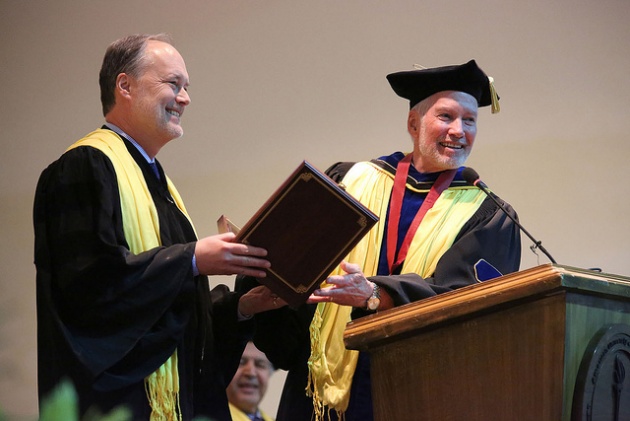The American University of Afghanistan started its activities in Afghanistan a few years ago, and has been attracting many Afghan male and female students due to the numerous facilities this well known university has. In August 2009, Dr. C Michael Smith was named President of the American University of Afghanistan. He is a graduate of the Institute for Educational Management at Harvard University and holds a Ph.D. in British and American Literature from the University of North Carolina, Greensboro. Before starting his activities in Afghanistan, he was serving on a number of boards and committees and on the faculty at Winthrop University, University of California, Los Angeles, and Elon University.

He has been involved in education and building support for it all his life. After he received his doctorate, he taught in several universities, and also has been at the head of educational foundations in urban school districts in two states, leading statewide higher education planning and assessment in another state, launching a higher education accreditation process in the Middle East, helping to establish a new university in Africa.
Reasons of interest in Afghanistan and its people:
Being perceptive as well as being hungry of education were the reasons which motivated him to be and work in Afghanistan after his summer trip there.
Current education system from Dr. Smith's point of view:
Dr. Smith thinks that the educational system of Afghanistan has been rebuilt after the Taliban regime, since in that period, no girls were at school, while now, there are many girl students in primary and secondary schools, and a huge number of graduate girls from schools who are looking for public and private universities all over Afghanistan.
He also believes that the universities are rebuilding their programs and faculties and improving the quality of instruction. However, there is still a great need for support of education to achieve the level of quality the country needs and the young people desire.
Challenges and problems which Dr. Smith faced in the higher education sector in Afghanistan:
The main challenge which Afghanistan higher education system faced is the lack of faculty members who hold doctoral degrees and master's degrees. Also, many of the courses are still taught in large classes with instructors who rely on outdated lecture notes delivered to students who are expected to memorize them. He also thinks that there is not enough attention to critical thinking, problem solving, group learning, and applying knowledge to new situations.
He also remarks that this is the beginning of change. There are many more well qualified faculties now and the Ministry of Higher Education is establishing a quality system that, once it is up and running, should be of a great help.
Female students at the University and their involvement in the University's activities:
According to statistics provided by Dr. Smith, over the last four years, AUAF has increased the percentage of women students from 16% to more than 30%. Especially promising is the percentage of women among the new students. This year, over 50% of the entering students were women. That is largely attributable to having increased scholarship funds available, thanks to a program funded by the U.S. Embassy in Kabul and also donations that the university has received for scholarships. The goals is to approach 50% of the student enrollment being women. On campus, women are actively involved in student life, in sports (we have women's basketball, volleyball, and soccer teams, for example), and in various clubs. Many of the clubs are service oriented and raise money for worthy causes.
Ways that education helps teenagers girls support women's empowerment in their community:
Dr. Smith thinks that it is very encouraging to see women and girls in a coeducational university such as the American University of Afghanistan. They are often among the best students and have assumed leadership positions. The boys have been influenced by the girls and respect them as individuals and as equal leaders. As these female and male students graduate and enter the work force and eventually have families of their own, they will carry their university experience with them. They have changed, grown and matured, and they will become the future leaders in business, government, and civil society. The impact they can have can be tremendous. For women who are no longer of school age, the university has established a new center, the International Center for Afghan Women's Economic Development, to assist women with training and other preparation for jobs and to help them establish or expand their own businesses.



